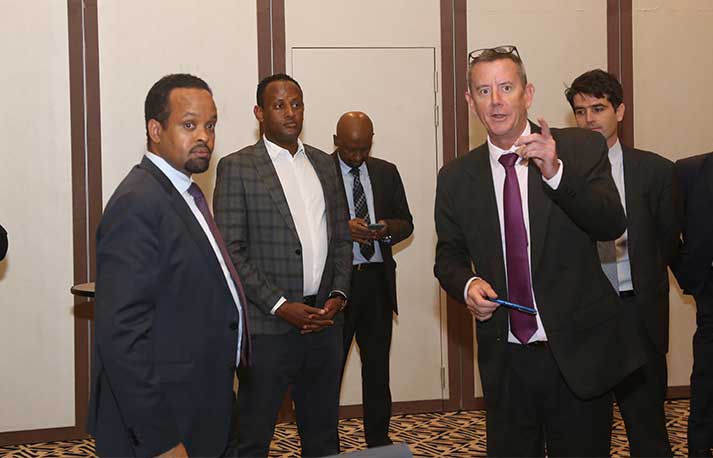
Radar | Apr 25,2020
Nov 27 , 2018
By Belay Abera
Not long ago, I came across something that should have been strange but all too common in Ethiopia. Around the main square of a town outside Addis Abeba at midday, a friend and I came up against two young boys embroiled in an intense fight with each other.
It was a gory sight to behold. But as the boys kept trying to knock the life out of each other, people gathered around them. Some dejectedly watched, others acted as if they have seen it all before and a few applauded. My friend and I considered breaking up the fight, but in a town that we were new to, we did not think this was wise. And neither were we able to contact the authorities in time to help end the brawl.
The fight soon ended after both were too tired and hurt to continue. One of the kids lost a tooth and was left with skin lacerations, facial swelling and bleeding. But it was the other kid that had the worst of it. Nobody tried to mediate between the boys or stop the violence, report to the police or call for help.
The violence could have been worse with grave consequences. Everyone that looks on during such situations is morally, if not legally, culpable. Most are merely trying to avoid being injured or becoming a witness. Cultural considerations also factor in. Few consider a street fight that leaves either side bloodied a matter for the authorities to get involved in, but something that can be worked out through networks in the neighbourhood.
But people that find themselves in these situations are culpable to the crime committed. They should report to the police, mediate between the parties or try to get help. If this had been the case, those boys would have walked off with their full teeth intact. Unfortunately, there are awareness, cultural and societal factors that guarantee that such situations are not handled appropriately.
Culpable crime is a crime of selfishness. Ignorance of such a crime is a factor, but in most cases, it is people being afraid of having to give witness, too busy to take the time to report the violence.
This is evident in the many harrowing stories of nocturnal traffic accidents, where they are not reported until daytime, not because no one was witness to it, but because passersby did not want to entangle themselves in legal processes. One can also notice variations of this in many people’s reluctance to get themselves involved in crimes of pickpocketing, especially of mobile phones and home burglaries.
Of course, the records of law enforcement bodies and the courts help in dissuading citizens. The speed and efficiency with which either of these institutions works and the unfortunate instances of abuse of power are not exactly incentivising for a passerby to get involved.
But of course that is not an efficient enough excuse not to respect the law, and citizens should be able to contribute their part to the betterment of this country just as much as they expect the government to do its part.
To control the crime, there should be a range of intervention activities to increase awareness within the community on the issue of culpable crime. This is not just through civics courses in schools and colleges but also through the use of mainstream media such as TV and radio.
Giving attention to culpable crime is very important for a developing country like Ethiopia. It helps crime prevention by formalising the process of reconciliation and information gathering. As in other crimes, the government should start to give unwavering attention to the growing legal issues of this manner.
Making the judicial and law enforcement bodies of the government efficient will also go a long way in making the authorities approachable to the public. There are moral questions to witnessing a crime and failing to report it, but smoothing out the relationship between the government and citizens should make it easier to do what is right.
PUBLISHED ON
Nov 27,2018 [ VOL
19 , NO
970]


Radar | Apr 25,2020

Fortune News | Feb 23,2019

(Addis) Fortune Audio | May 27,2020

My Opinion | Aug 16,2020

Exclusive Interviews | Oct 09,2021

Fortune News | Apr 04,2020

Fortune News | Jun 23,2019

Viewpoints | Aug 03,2019

Commentaries | Dec 07,2019

Editorial | Mar 27,2021

Photo Gallery | 179858 Views | May 06,2019

Photo Gallery | 170053 Views | Apr 26,2019

Photo Gallery | 161030 Views | Oct 06,2021

My Opinion | 137222 Views | Aug 14,2021

Dec 22 , 2024 . By TIZITA SHEWAFERAW
Charged with transforming colossal state-owned enterprises into modern and competitiv...

Aug 18 , 2024 . By AKSAH ITALO
Although predictable Yonas Zerihun's job in the ride-hailing service is not immune to...

Jul 28 , 2024 . By TIZITA SHEWAFERAW
Unhabitual, perhaps too many, Samuel Gebreyohannes, 38, used to occasionally enjoy a couple of beers at breakfast. However, he recently swit...

Jul 13 , 2024 . By AKSAH ITALO
Investors who rely on tractors, trucks, and field vehicles for commuting, transporting commodities, and f...

Nov 1 , 2025
The National Bank of Ethiopia (NBE) issued a statement two weeks ago that appeared to...

Oct 25 , 2025
The regulatory machinery is on overdrive. In only two years, no fewer than 35 new pro...

Oct 18 , 2025
The political establishment, notably the ruling party and its top brass, has become p...

Oct 11 , 2025
Ladislas Farago, a roving Associated Press (AP) correspondent, arrived in Ethiopia in...

Nov 2 , 2025
The National Bank of Ethiopia (NBE) has scrapped the credit-growth ceiling that had s...

Nov 2 , 2025 . By SURAFEL MULUGETA
The burgeoning data mining industry is struggling with mounting concerns following th...

Nov 2 , 2025 . By YITBAREK GETACHEW
Berhan Bank has chosen a different route in its pursuit of a new headquarters, opting for a transitional building instea...

Nov 2 , 2025 . By BEZAWIT HULUAGER
Nib International Bank S.C. has found itself at the epicentre of a severe governance...